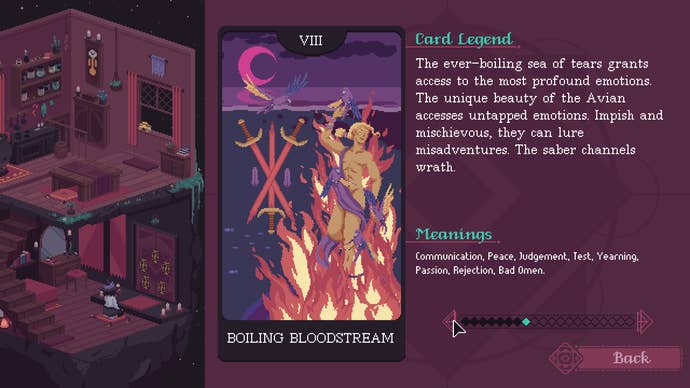The Cosmic Wheel Sisterhood: the Talking Simulator remains gaming’s most exciting genre
Ancient gods, secret societies, and designing your own Tarot deck? Devolver really do publish the most interesting stuff.
Deconstructeam, the Spanish microstudio responsible for iffy-but-interesting Gods Will Be Watching and beloved cult hit The Red Strings Club, have returned to the point & click genre with The Cosmic Wheel Sisterhood, a game that swirls with mysticism and Wiccan fantasy lore like a Brighton pop-up shop swirls with Nag Champa.
And, let’s be clear, it’s great. The demo we’ve been given access to covers the opening act, essentially a tutorial, which introduces us to some of the characters and the core game mechanic that sits alongside the conversation system. Essentially you are a fortune teller, cast out of your witches commune by a corrupt leader for the crime of being far too good at your job and prophesying the group’s downfall. Sentenced to imprisonment on a comet for 1000 years, you summon an ancient spirit/Behemoth/multi-armed scorpion man thing after two centuries of isolation because, frankly, you’re bored. Understandably so.
So, there’s a lot of talking. Those familiar with The Red Strings Club, or similar games like Coffee Talk, will find this very familiar. Via the medium of conversation and speech checks you can tease out information about the wider world and win favour with certain characters via charm or intimidation. You can also, presumably, upset people, but I didn’t during my hour with the game because I’m too much of a shitebag to go renegade. But the tl;dr is that it’s a choice and consequence visual novel about love, magic, fate, and reality, and the writing is snappy enough to keep your eyelids open while you wade through all the text dialogue (there’s no voice acting, and it’s frankly for the best, because all it does in games like this is spoil the flow).

The main operational difference between this game and many of its contemporaries is that, instead of mixing beverages, you’re designing tarot cards. These are the means by which you tell fortunes. There are some light RPG mechanics going on in here which determine the kinds of fates you will uncover for the various characters you will meet. You have a lot of freedom in designing your deck: multiple choice questions determine your options, and the design elements you choose (background image, characters, foreground objects and symbols) determine how the card will be interpreted in dialogue – to put it simplistically, whether or not it spells good or bad consequences when drawn in a tarot reading. Where you place the visual elements of your card seems to have an effect on its stats, too. There seems to be a reasonably complex system under the hood that’s driving all this, one that clever players will certainly be able to figure out. I’m a moron, so my experience of it was pure, chaotic experimentation, always approving the final design of a card with “I guess that’ll do!”.
The fortunes that your character, Fortuna (lol) will end up predicting are actually steered by you so, in some sense, there’s a meta-game going on here where you, the player, become something of a narrative director. During most conversations with new characters, an opportunity will come up to predict their fate. The cards in your deck will be shuffled and one chosen at random, and applied to the question at hand. The alchemic mix of the card’s stats will determine the multiple choice answers available to you, ranging from pleasant to harrowing, and it’s up to you what you want to reveal.

For some characters, reassuring them that everything will turn out swell might be the key to securing their loyalty. Others may be spurred into action on your behalf only with a heavy dose of bad news. Determining how to steer the narrative toward the best outcome, whatever you think that might be, is where the game ‘lives’. I suspect that the replay value of The Cosmic Wheel Sisterhood will be immense.
Games like these, which are highly relationship focused, have a big crossover appeal with RPG nuts. It’s wonderful that small studios are able to use the visual novel format to tell the kinds of huge, engrossing stories that AAA seems determined to jettison in favour of endless live service nonsense. It’s fast becoming one of my favourite genres, which I’m genuinely surprised about, but I think ultimately what they do is allow writers to write their socks off: which they have to do, because games with minimal action give the words nowhere to hide. They live and die entirely on the quality of the script.

And so, this is the sort of game where the best writing in the medium is happening. And for similar reasons, some of the best art direction and sound design too. Conjuring an entire fantasy universe of ancient gods, secret societies, and hidden witchy lore is hard to do with such humble tools as the ones available to a tiny dev studio in Valencia, but The Cosmic Wheel Sisterhood managed to conjure up something very enticing in the short time we spent with it. You can almost feel the dramatic heft of the behemoth as he curls around your cosmic abode to tap on your window. You can feel the hurt of an unjust exile. You can smell the patchouli.
The Cosmic Wheel Sisterhood is coming to PC and Switch this year. And it plays beautifully on Steam Deck, by the way.


